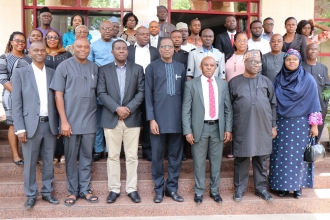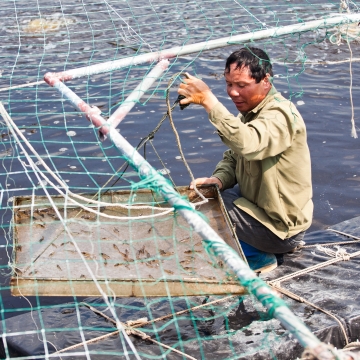Conspiring to Violate Fishing Regulation: the Case of Saiko Fishing in Ghana
The capture fisheries sector is a critical source of animal protein in Africa. In addition, the sector creates jobs, and contributes significantly to agricultural GDP and non-traditional export
The impact of collective use rights on share contracts: the case of the Extractive Artisanal Regime (RAE) in Chilean hake fisheries
Share contracts are the dominant remuneration system in artisanal fisheries. Introducing regulations based on collective use rights may affect the way profits are distributed. The literature on the effect of regulatory reform on factor income distribution, however, is scarce. In this paper, we look at differences in the implementation of the Extractive Artisanal Regime in Chilean hake artisanal fisheries to test its effect on share contracts. We estimated a switching regression model using census data to calculate the average treatment effect.
Adoption of Improved Aquaculture Management Practices by Cluster Fish Farmers in Delta State, Nigeria
The adoption of proven fish production management practices portends many economics and social implications. Interview schedule was employed to generate primary data from 146 respondents in the four cluster fish farms (estates) in two local government areas and analyzed with descriptive and inferential statistics. Information on socio economic characteristics revealed that most of the respondents were in the active age bracket of 30-40 years, well educated and small scale fish farmers with fewer years of experience members at fish farmers association and married.
Exploring the adaptive capacity of the mussel mariculture industry in Chile
Societies have adapted to climate and environmental variability throughout history. However, projected climate change poses multiple risks to mariculture because of the increased frequency of environmental threats that lie outside the realm of present day experience. Adaptive capacity evaluated in this study is a characteristic that would reflect mariculture industries ability to anticipate and respond to these changes, and to minimize, cope with, and recover from the consequences and take advantage of new opportunities arising from change.

REPRC EfD Nigeria Holds Policy Day
The Resource and Environmental Policy Research Centre (REPRC), EfD Nigeria on October 17, 2019 held a policy interaction with stakeholders from Federal Ministry of Environment and Federal Ministry of…
Policy Dialogue with Mukono District Leadership
Environmental Economists from the Environment for Development-Makerere University (EfD-Mak) Centre on 20th February 2020 conducted a policy tour of Mukono District Local Government headquarters where
First Policy dialogue on Governance and Natural Resources
Environment for Development Initiative (EfD–Mak) Centre on 7th November 2019 hosted its first policy dialogue on Governance and Natural Resources at the Senate Conference Room Makerere University. The
Sustainable fisheries and aquaculture management
Overfishing and depleted fish stocks are the results of open-access conditions where an individual fisher is acting in line with what is best for her personally. However, the joint outcome of all
Pagination
- Previous page
- Page 22
- Next page

